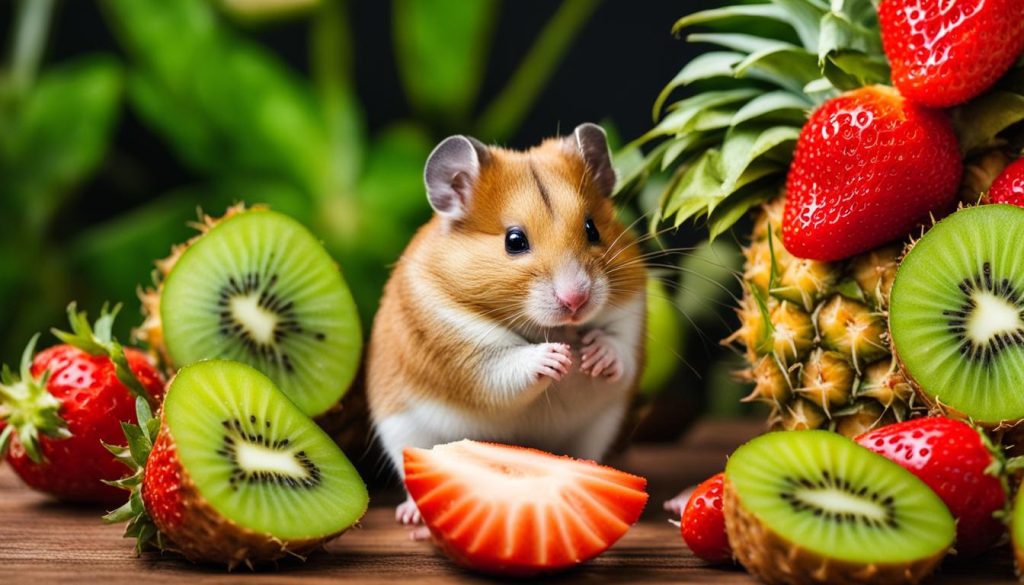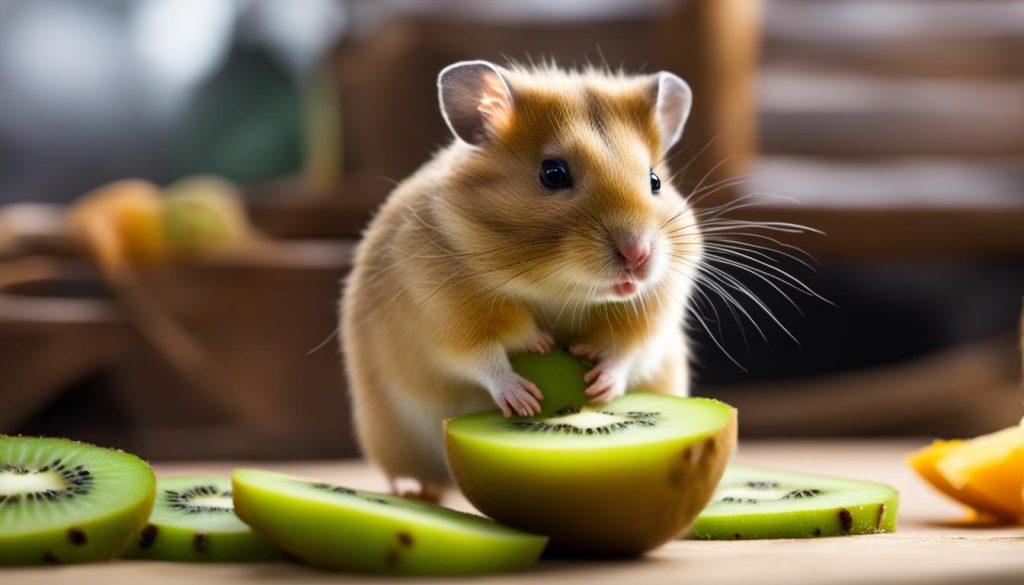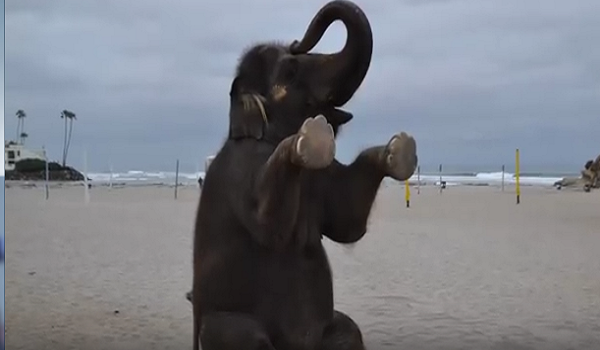Hi there! If you’re a hamster owner like me, you may have wondered whether it’s safe to give your furry friend some kiwi as a treat. The good news is that yes, hamsters can eat kiwi! However, it’s important to keep a few things in mind to ensure their safety and well-being.
Kiwi is a safe fruit for hamsters, but it should only be given in moderation. This is because kiwi is high in sugar, and consuming too much can lead to health issues such as dental problems, weight gain, and diarrhea. To prevent these problems, it’s crucial to offer small portions of kiwi and remove the peel and seeds before feeding it to your hamster.
Can Hamsters Eat Kiwi? Yes, they can, as an occasional treat.
- Kiwi can be safely fed to hamsters, but in moderation.
- Remove the peel and seeds before giving kiwi to your hamster.
- Overfeeding kiwi can cause dental issues, weight gain, and diarrhea.
- Offer small portions of kiwi to prevent adverse health effects.
- Monitor your hamster’s health for any signs of discomfort or adverse reactions.
By following these safe feeding tips, you can treat your hamster to some kiwi while ensuring their overall well-being. Remember, moderation is key when it comes to introducing new foods into your hamster’s diet. Keep an eye on your furry friend and enjoy watching them savor this delicious treat!
Nutritional Value of Kiwi for Hamsters
Kiwi is a delicious and nutritious fruit that can provide some valuable nutrients to hamsters. This section will discuss the nutritional value of kiwi for hamsters and its role in their diet.
Kiwi contains a variety of essential nutrients that can benefit hamsters. It is rich in water, carbohydrates, sugars, fiber, protein, total lipid (fat), calcium, iron, magnesium, phosphorus, potassium, and sodium. These nutrients contribute to the overall nutritional profile of kiwi, making it a valuable addition to a hamster’s diet.
However, it’s important to note that while kiwi is high in vitamin C, which is beneficial for humans, hamsters do not necessarily require vitamin C in their diets. Unlike humans, hamsters can produce their own vitamin C, so it is not an essential nutrient for them. Nevertheless, including small amounts of kiwi in a hamster’s diet can be beneficial, especially for hamsters that are stressed or unwell.
When feeding kiwi to hamsters, it’s important to offer it in moderation and as part of a balanced diet. While the nutritional value of kiwi can provide some benefits to hamsters, it’s crucial to remember that it should be viewed as a treat rather than a staple food. Feeding hamsters excessive amounts of kiwi can lead to health issues such as weight gain and dental problems.
Overall, kiwi can be a nutritious and refreshing addition to a hamster’s diet. By providing small portions of this fruit, hamster owners can offer their pets a variety of nutrients while ensuring their overall health and well-being.
Health Benefits of Kiwi for Hamsters
When it comes to the benefits of kiwi for hamsters, the high moisture content and micronutrients in this fruit can play a positive role in their overall health. Kiwi is a great source of hydration for hamsters, as it has a high water content that can help in maintaining proper moisture levels in their bodies. Additionally, the fruit contains a variety of micronutrients that can contribute to their well-being.
One notable benefit of kiwi for hamsters is its rich antioxidant content. Antioxidants play a crucial role in boosting the immune system and protecting their bodies against free radicals, which can cause damage to cells and tissues. Including kiwi in their diet can support their immune system and enhance their ability to fight off illnesses.
Moreover, the high fiber content in kiwi can aid in digestion for hamsters. A well-functioning digestive system is vital for proper nutrient absorption and waste elimination. By including kiwi in their diet, hamsters can benefit from improved digestion and gut health.

It’s important to note that while kiwi does offer certain health benefits to hamsters, its main advantage lies in its moisture content and antioxidant properties. Other nutrients present in kiwi, such as vitamin C, may not have significant effects on hamsters’ health due to their ability to synthesize this vitamin internally. Therefore, while kiwi can be a valuable addition to their diet, it should be viewed as a complementary treat rather than the primary source of nutrition.
When introducing kiwi to your hamster’s diet, always remember to offer small portions and remove the peel and seeds. This will help prevent any potential choking hazards or digestive issues. By following these guidelines, you can ensure that your furry friend can enjoy the health benefits of kiwi while also maintaining a balanced and nutritious diet.
Risks and Precautions When Feeding Kiwi to Hamsters
While kiwi is generally safe for hamsters, it’s important to be aware of the potential risks and take necessary precautions when including it in their diet. Kiwi contains oxalates, which can bind to calcium and increase the risk of bladder stones in hamsters. Additionally, the high water content in kiwi can lead to diarrhea, and the high sugar content can contribute to weight gain and dental issues.
When feeding kiwi to hamsters, it’s crucial to offer small portions of ripe fruit. Remove any leftover pieces from the cage to prevent health issues. If your hamster shows signs of diarrhea after consuming kiwi, it’s important to seek immediate veterinary care.

Feeding Guidelines for Kiwi
When it comes to feeding kiwi to your hamster, it’s important to consider their size and dietary needs. As a general rule, offer a chunk of kiwi that is approximately the size of their paw. This equates to a small piece for humans, ensuring that you’re not overfeeding your furry friend.
Before feeding kiwi to your hamster, make sure it is fully ripened and peeled. The skin and seeds should be removed, as they can present a choking hazard and cause digestive issues. By providing only peeled kiwi, you can offer a safer and more enjoyable snack for your hamster.
It is recommended to offer small pieces of kiwi as an occasional treat, no more than once or twice a week. This moderation helps prevent overfeeding and mitigates potential health issues that could arise from excessive fruit consumption.
Remember, while kiwi can be a nutritious addition to your hamster’s diet, it should not be a staple food. Always ensure that your hamster has access to a balanced diet of hamster pellets and other appropriate foods to meet their nutritional needs.
By following these feeding guidelines, you can provide your hamster with a safe and enjoyable snacking experience, while also promoting their overall health and well-being.
Conclusion
After considering the nutritional value, health benefits, risks, and feeding guidelines of kiwi for hamsters, it can be concluded that kiwi can be safely fed to hamsters in moderation. However, there are some important factors to keep in mind.
Firstly, it is crucial to follow the recommended feeding guidelines. Hamsters should be given small portions of ripe kiwi, with the peel and seeds removed to avoid any potential health issues. Offering a chunk of kiwi the size of their paw, about equivalent to a small piece for humans, is a good rule of thumb.
Secondly, it is important to monitor the hamster’s health for any signs of adverse reactions. While kiwi is generally safe for hamsters, some individuals may have sensitivities or allergies to certain fruits. If any signs of diarrhea, weight gain, dental problems, or other health issues occur after feeding kiwi, immediate veterinary care should be sought.
Lastly, it is essential to view kiwi as a treat rather than a staple in a hamster’s diet. Hamsters require a balanced diet of hamster pellets and other appropriate foods to meet their nutritional needs. Kiwi can be a refreshing and beneficial addition to their diet, but it should not replace their staple food sources.
Feeding kiwi to hamsters can offer some nutritional benefits and hydration, but it should be done in moderation and with caution. By following the feeding guidelines, removing the peel and seeds, and monitoring the hamster’s health, kiwi can be enjoyed as a safe and occasional treat. With proper care and a balanced diet, hamsters can thrive and enjoy the occasional delight of kiwi.
FAQ
Can hamsters eat kiwi?
Yes, hamsters can eat kiwi in moderation.
Is kiwi safe for hamsters?
Kiwi is generally safe for hamsters, but there are some precautions to consider.
What are the nutritional benefits of kiwi for hamsters?
Kiwi contains water, carbohydrates, sugars, fiber, protein, total lipid (fat), calcium, iron, magnesium, phosphorus, potassium, and sodium.
What are the health benefits of kiwi for hamsters?
Kiwi can provide some health benefits to hamsters due to its high moisture content and micronutrients.
What are the risks and precautions when feeding kiwi to hamsters?
Kiwi is high in oxalates, can cause diarrhea, weight gain, and dental issues. It is important to feed hamsters small portions and remove any leftover fruit from the cage.
How much kiwi can hamsters eat?
Hamsters should be given a small piece of fully ripened and peeled kiwi about the size of their paw once or at most twice a week.
Can hamsters have kiwi as a snack?
Yes, kiwi can be given to hamsters as an occasional snack.






